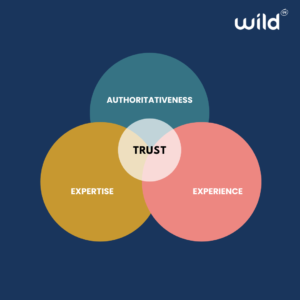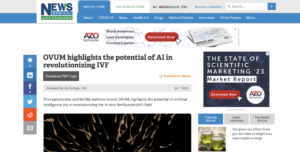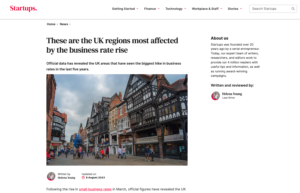At the end of 2022, Google introduced E-E-A-T, formerly just E-A-T. The acronym stands for experience, expertise, authoritativeness, and trustworthiness. ‘Experience’ is the most recent parameter that Google added to its Search Quality Guidelines.

If brands can prove they’re meeting E-E-A-T signals by providing audiences with top-quality content, then Google will secure you a top spot in the SERPs. Let’s break it down:
– Experience: Experience is the latest signal within E-E-A-T, demonstrating that a brand needs to have experience in its field. For example, if you’re a health brand, you will benefit by showcasing proven results of the treatments you offer etc.
– Expertise: As well as experience, content authors must prove they have topical expertise. Expertise could include having the knowledge, qualifications, credentials, and credibility to share reliable content on your site or with third parties (news outlets). Expertise and experience overlap slightly, but they’re not the same. For example, expertise could be explained as giving advice, whereas experience could be giving examples or showing case studies of your work.
– Authoritativeness: Not only should you come across as the expert in your field, but you should be the authority too. This comes from receiving mentions from other credible sources, such as your content achieving backlinks and mentions from other sites.
– Trustworthiness: Experience, expertise, and authoritativeness all contribute to a user’s trustworthiness of your site. Content should hold as much credibility as possible, and the site must also have a good user experience.
YMYL sites and pages
Ensuring you’re meeting E-E-A-T signals is essential for any brand, particularly if your brand sits within sectors that fall within legal, financial, medical, and safety umbrellas. Typically, these types of verticals are untrusted by customers and Google.

The type of brands that fall within these categories or cover content on these topics are classified as a ‘Your Money or Your Life’ (YMYL) site or page. This is because Google considers these types of subjects ‘high stakes’, where they must be rich in experience, expertise, authoritativeness, and trustworthiness.
It’s important that these types of sites are high-quality because customers must be able to consume trustworthy and accurate information. For example, if you’re a business within the financial sector and you’re giving money advice, it needs to be to a high standard and backed up with credible research and evidence. A finance site giving out bad money advice could have detrimental consequences for readers who follow the information.
However, if you’re a finance site that can offer expert-led advice supported by research and give your readers helpful solutions that work, Google will give you a big green tick, and you might find your brand ranking higher in the SERPs!
Examples of YMYL sites doing it right include:
– Healthline: A source of credible health and medical news and information
– Financial Times: The world’s leading global business publication covering news, analysis and comment on business, politics, and world affairs topics
– Health and Safety Executive: Guidance, advice, news and legislation from Great Britain’s independent regulator for work-related health and safety
– Amazon: Multinational technology business focusing on eCommerce, cloud computing, online advertising, digital streaming, and artificial intelligence
Digital PR and E-E-A-T
Whether you’re classified as a YMYL site or not, you should do your best to meet E-E-A-T parameters, and digital PR can help you do just that.
Digital PR and experience and expertise
When Google is deciding whether or not your site should be trusted or not, they will look for expertise and experience signals. Digital PR can help improve these signals, and tactics to secure these parameters include thought leadership PR, such as interviews, industry-specific features, or commentary in relevant publications.
If you’re a professional in your field and can offer value to a conversation/trending topic, creating content around this is a good way for a brand to generate brand awareness and build authority.

Digital PR and authoritativeness
A good way to show you’re an authority within your industry is by generating backlinks and brand mentions from other high-authority sites. Developing digital PR campaigns or contributing to thought leadership editorial is a way to create these regular links from third-party sites (such as news publications).
Creating a digital PR campaign showcasing new findings or research relevant to your niche and outreach to relevant journalists will support your website being referenced in top-tier publications.

Digital PR and trustworthiness
Using robust data and research within your digital PR campaigns is a good way to showcase your trustworthiness. For example, this type of data could come from Freedom of Information Requests (FOIs), surveys with high responses from a credible survey provider, or own company data.
Journalists are highly attracted to PR campaigns that can give them access to unique and robust data, which could help generate backlinks to your site at scale. However, it’s important to note that it’s the relevancy of backlinks that matter, not necessarily the amount.

TOP TIP: Always remember to provide journalists with a water-tight methodology that shows how you sourced information or came up with the findings within your PR campaign. In doing this, you’ll be meeting E-E-A-T requirements.
In a recent update from Google (November 2023), they’ve highlighted the significance of E-E-A-T once again, emphasising its relevance not only in Search but also in Discover. This reaffirms what we’ve been advocating – E-E-A-T’s pivotal role in online visibility. Google’s systems will now look to show the most helpful, relevant, and reliable information possible to its searchers.
As we enter 2024, it’s essential to consider how you plan to showcase E-E-A-T through your brand’s experts. Some points to consider include:
- Build author pages on your site so Google can learn more about the people behind your content.
- Ensure author pages are up to date with detailed bios, qualifications, experience, and links to any relevant content.
- As mentioned further up in this blog, ramp up digital PR and thought leadership!
If you can tailor your digital PR towards Google’s E-E-A-T signals, you’ll be on your way to generating impactful results that matter to your business.
To learn more about how your business can meet E-E-A-T signals through a bespoke SEO-driven PR strategy, get in touch with our team or book a 30-minute introductory call with Katrina Cliffe.